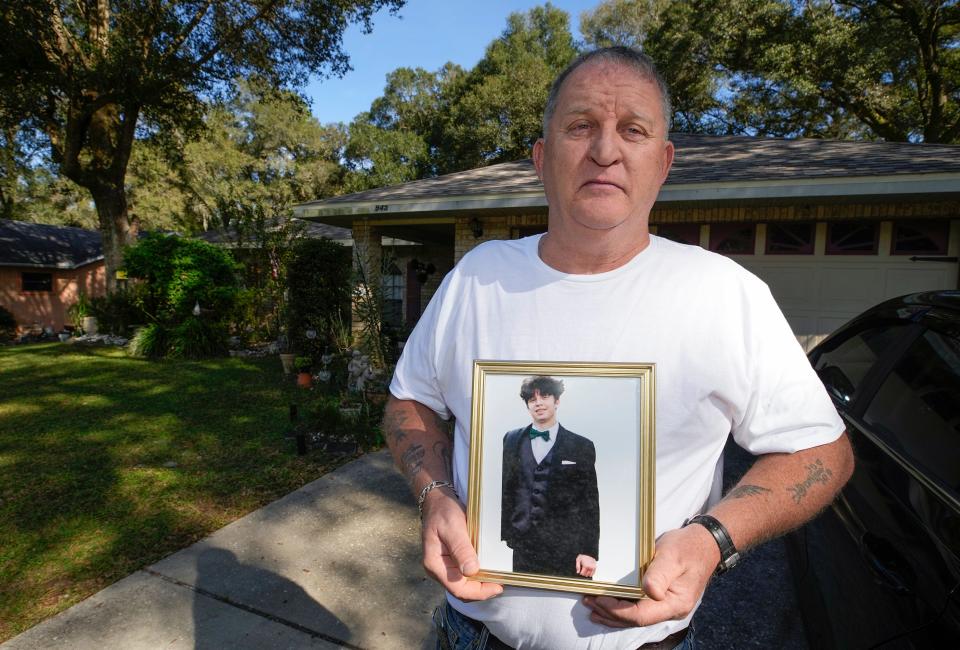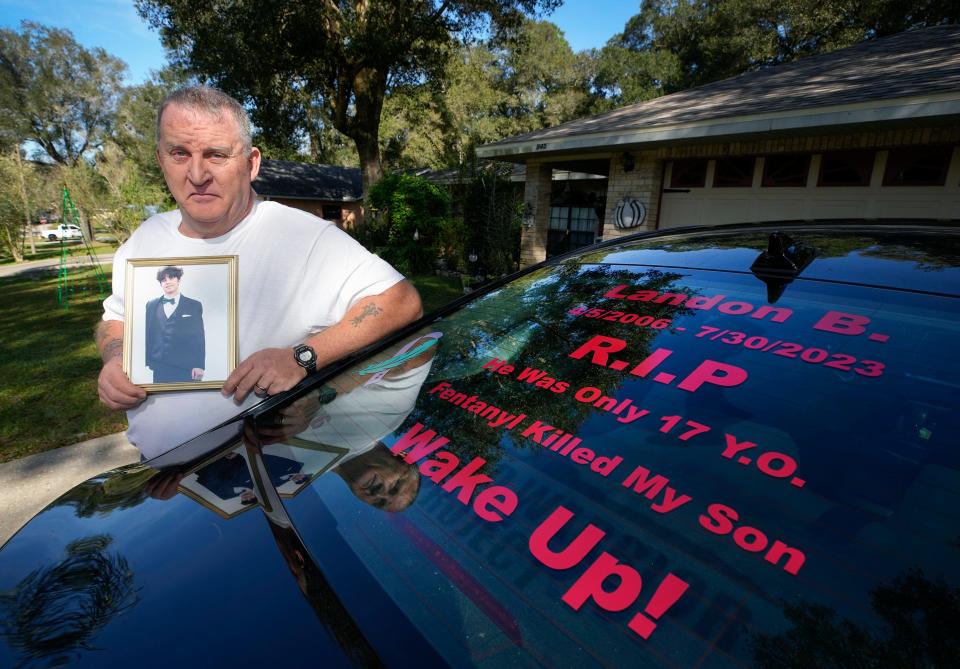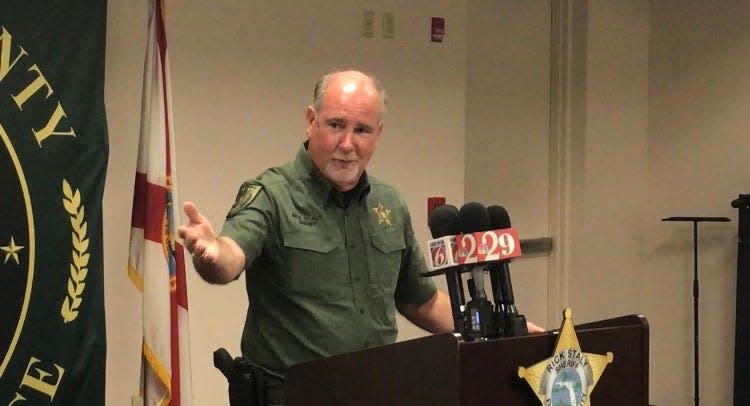Fentanyl doesn't discriminate as it continues to kill in the Daytona Beach area
Andre Boren is always looking for a message from his 17-year-old son.
It could be anything out of the ordinary, like the way the light shines on his picture.
Landon Boren died weeks shy of starting his senior year at DeLand High School after taking what he thought was cocaine but turned out to be fentanyl.
“I'm always looking for signs to know that he's OK," Andre Boren said. "So, if I see something that's out of place, it might just be my imagination but I believe in God and the angels. And I believe in God's magic."
He said he thinks it's his son saying, "Hey, Dad, I'm OK. You don't have to worry about me.”
Boren, who is an investigator with the medical examiner’s office that serves Seminole and other area counties, has been to many fentanyl overdose scenes. But it was a shock when he walked into his son’s room that afternoon.
And it is a shock that many other families are experiencing. More people die from drug overdoses in Volusia County than traffic crashes, according to the Volusia County Medical Examiner’s Office.
And the deadly drug fentanyl, a synthetic opioid, is a nationwide problem that continues to claim victims from across the social spectrum, both young and old, rich and poor.
“Fentanyl continues to be a big issue for Volusia County and the country in general,” Volusia County Medical Examiner James Fulcher said, stating the drug was involved in 81.2% of overdose deaths in 2022.
He said his office sees very little heroin and that fentanyl is what is typically put in illicit substances in Volusia County.
“This is a national crisis,” Fulcher said.

It remains a crisis even though numbers are trending down, particularly when compared to a COVID-19 pandemic-induced spike in 2020. Fulcher said the increase during COVID was in part due to the fact that people could not access resources in person, such as in-patient rehabilitation and Narcotics Anonymous meetings.
He said that street drugs typically contain a mix of two or three of the following: fentanyl, methamphetamine and cocaine.
“The combination of these drugs is highly toxic and dangerous,” Fulcher said. “Taking two of these three is way worse than taking just one of them. The toxicity is greatly increased.”
Fulcher said some of the people using the drugs already suffer from heart disease, which means even lower levels of the drugs can be deadly.
He said 41 of the drug overdose deaths in 2022 were victims between the ages of 60 and 69. And 71 were between the ages of 50 and 59.
The total number of "accidental drug deaths" in 2022 was 335 people, according to the ME's report.
In some of the cases, about 7%, Fulcher is seeing xylazine, a veterinary tranquilizer. It is used as a cutting agent.
Fulcher said he rarely sees prescription drugs like oxycodone and alprazolam anymore. Now it’s fentanyl, meth and cocaine.
'Fentanyl is easy to smuggle'
“The vast majority is fentanyl and there’s a good reason for that,” Fulcher said. “Fentanyl is very easy to produce and to smuggle across our country's borders. It’s toxicity is extremely high and small amounts of fentanyl brought across our borders certainly can create many many, many doses on the street, and that's the advantage.”
And the drug has touched every social economic status.
Daytona Beach Police Detective Jonathan Abbate and Sgt. Thomas Monaco are on the front lines in the fight against fentanyl.
“I respond to a lot of overdoses and I can tell you that it touches all types of people. The poor, the rich, the, you know, the middle class,” Abbate said. “I’ve been to overdoses and the person who passed away is a very wealthy person or I've been to overdoses where the person is living in the woods. The drug doesn't discriminate at all. It's an addictive drug that is taking over, in my opinion.”
One resource the city uses to try to prevent deaths is the DART Team, also known as the Drug Abuse Response Team, said Monaco, who supervises the unit.
The DART team includes personnel from the health department, the fire department and SMA Healthcare. Team members visit overdose survivors to offer help by way of services.
“That again has been beneficial to a certain extent,” Monaco said. “But it's like plugging a big hole in the Hoover Dam … with a piece of Scotch tape.”
And sometimes children have been exposed to the drug.
“You see stories with users with kids getting exposed to this stuff and actually dying from it,” he said. “I mean, these are true victims. They have nothing to do with it. But they're suffering as a result of the addiction, whether it’s their mother or father or whoever.”
If you need help for yourself or someone else, Monaco said you can call the Daytona Beach Police Department 386-671-5100 and ask for him and he can guide you to services.
Young lives cut short by fentanyl
Landon Boren would have entered his senior year at DeLand High School in August. He was working at the DeLand Skating Rink. Andre Boren said his son told him that he wanted to be a professional boxer. And when he retired from boxing, he wanted to work as a pharmacist.
But on July 30, Landon's dreams were cut short. And a nightmare began for his family.
Andre Boren said his son had returned home late the previous night. But by 3 p.m. Sunday when Landon still had not stirred from his room, Andre Boren walked in.
"This time, I went inside the room and I saw the powder on top of his cellphone. I saw a straw between his legs. I touched him, looked at him, pinched him, slapped him a couple times to wake him up, try to wake him up, and he was gone."
He said he has worked death investigations for nearly 25 years and has worked close to 100 drug overdoses. He said most of his cases have been adults.
"Most of them are drug addicts," Andre Boren said. "And they just bought the wrong batch and they died. My son, he wasn't a drug addict, he just wanted to experiment.
"Kids are getting bored smoking weed." Andre Boren said. "He wanted to try something else. And unfortunately he was sold what he thought was cocaine and he was getting fentanyl. And there was nothing I could have done for him."
He said his son had been smoking marijuana and vaping, but he was unaware of any cocaine use.

"He was working all the time, he was busy, he just got a girlfriend, he was in and out, in and out and I didn't see it," Andre Boren said.
He said at a memorial service for his son, many kids showed up for him, including transgender students, whom he looked out for.
"They all came up and spoke for him. And he stood up for them, talked to them, he gave them a hug when they needed a hug," Andre Boren said. "When they needed protection he was around and I was just amazed. All those showing up for the church service for him."
In October, the Volusia Sheriff's Office arrested Daniel Arvizo in Landon Boren's death. Arvizo turned 18 on Oct. 21 at the Volusia County Branch Jail, where he is being held without bond.
Arvizo had sold drugs to Boren, who thought he was buying cocaine, according to a sheriff's office Facebook post.
Andre Boren said that he hopes recounting what happened to his son saves lives.
"I'm hoping that we will be able to save one life. At least one kid is going to think about it and say, 'Hey, nah, I remember Landon and I'm not touching this.'"

Andre Boren continues to look for signs, like the one with a picture of his son with some friends on a school trip.
"I saw a light within the picture that I have never seen before," he said.
The light was there for just a few seconds.
"And after that I tried to recreate the light by turning lights on and putting the blinds different ways, I could never recreate that lighting to the picture," Boren said. "My perception of that was that that was a sign from him to let me know that he was good."
'Poison peddlers'
Flagler County Sheriff Rick Staly said law enforcement uses the term "poisonings" to refer to drug deaths rather than overdoses because people dying from the drugs don't usually expect them to be laced with fentanyl.

"Most of these people are not trying to commit suicide," Staly said. "They have an addiction problem."
While Flagler County is smaller than Volusia, it too is battling “poison peddlers,” Staly said.
Staly himself stopped a car Nov. 6 for a traffic violation which led to seizing fentanyl.
He said the problem begins at the border.
“It's pouring across the southern border,” Staly said. “I've been to the border twice. I've seen it firsthand. What goes on at the border makes every city and county in America a border state whether we are at the border or 1,500 miles away. It's just ridiculous.”
Staly said the federal government is not enforcing the law at the border. He said the border patrol estimated they seize 20% of what gets through. Staly said he was last at the border in McAllen, Texas, 15 to 18 months ago. He also visited smaller communities.
Money seized from drug dealers paid for the flights and hotel costs, said Staly, adding he paid for his meals. The trips were sponsored by U.S. Rep. Kat Cammack, a Republican representing Florida's 3rd District.
Staly said that earlier this year, the Flagler County Sheriff's Office, along with other law enforcement, shut down a drug-trafficking organization based in Flagler County that was linked to a Mexican cartel.
"There is a clear nexus between the drugs in Orlando and Daytona Beach with the drugs we see in Flagler County with the one exception of the drug-trafficking organization that we shut down, but that was more cocaine than fentanyl," Staly said.
"It knows no age limitation — it can be your 17-year-old and younger all the way up to somebody in their 60s and 70s. It knows no social-economic difference," Staly said.
Staly said 100,000 people die every year from fentanyl across the country. He said that includes people who could have a mix of drugs in their system.
“It just takes a pinhead amount of fentanyl and it can be a lethal dose,” Staly said.
The Flagler County Sheriff’s Office has so far this year seized at least 210.02 grams of fentanyl, which is enough to kill the entire county. Flagler County has a population of 126,705 people, according to the census bureau figures from 2022.
Fentanyl also poses a threat to law enforcement. A Flagler County Sheriff's deputy was administered Narcan, which reverses the effects of fentanyl, after being exposed to the drug during a traffic stop.
In 2021, the Flagler County Sheriff’s Office used Narcan 117 times and firefighters used it 301 times. Sometimes a single person must have two or three doses to reverse the effects.
The Volusia Sheriff's Office did not respond to a request from the News-Journal for an interview for this story.
Volusia County drug overdose deaths
Drug overdoses compared to motor vehicle deaths in Volusia County, according to the Volusia County Medical Examiner's Office:
2022: 335 drug overdose deaths versus 142 deaths from motor vehicle crashes.
2021: 400 drug overdose deaths versus 152 deaths from motor vehicle crashes.
2020: 343 drug overdose deaths versus 155 deaths from motor vehicle crashes.
2019: 187 drug overdose deaths versus 128 deaths from motor vehicle crashes.
2018: 190 drug overdose deaths versus 124 deaths from motor vehicle crashes.
2017: Drug overdoses and deaths from motor vehicle crashes both were 146.
Accidental Drug Deaths by Ages in 2022 in Volusia County, according to Volusia County Medical Examiner's Office:
Two people ages 10 to 19.
39 people ages 20 to 29.
93 people ages 30 to 39.
85 people ages 40 to 49.
71 people ages 50 to 59.
41 people ages 60 to 69.
Four people over 69 years of age.
Daytona Beach Police Department 2023 approximate year-to-date:
Total suspected overdoses: 305.
Suspected fatal overdoses: 57.
Naloxone (Narcan) used: 215.
Flagler County drug overdose deaths
Flagler County listed 28 deaths as “accident drug intoxication” in 2022, according to the District 23 medical examiner’s office which covers Flagler, St. Johns and Putnam counties. That was up from 20 “accident drug intoxication” deaths in 2021.
This article originally appeared on The Daytona Beach News-Journal: Fentanyl doesn't discriminate as it kills in Daytona Beach, Florida

